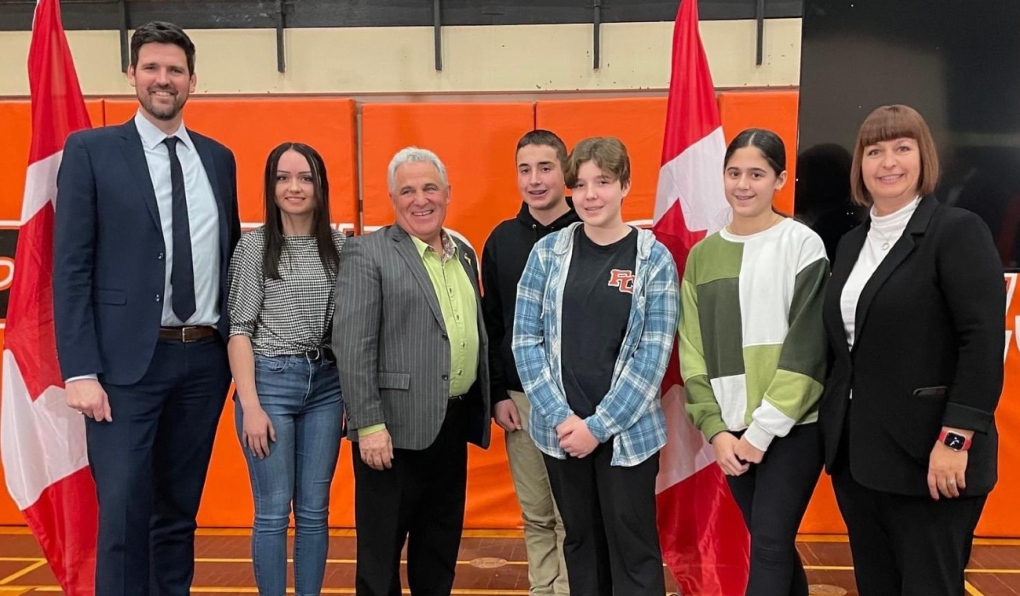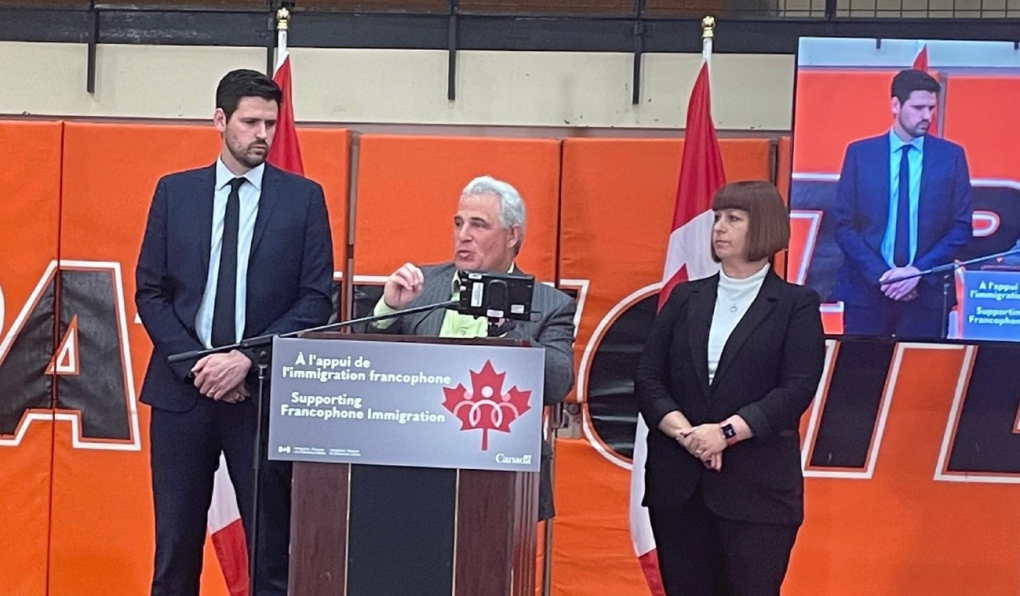Canada welcomes the most francophone immigrants since 2006
Federal officials announced Monday in northeastern Ontario that Canada has achieved its 2022 target of 4.4 per cent of French-speaking immigrants outside Quebec.
Sean Fraser, minister of immigration, refugees and citizenship was at École secondaire catholique Franco-Cité in Sturgeon Falls for the official announcement.
He was joined by his parliamentary secretary, Marie-France Lalonde, and local Nickel Belt MP and Parliamentary Secretary to the Minister of Official Languages Marc Serré.
 MPs Sean Fraser, Marie-France Lalonde and Marc G. Serré officially announce that Canada achieved its 2022 francophone immigration targets at École secondaire catholique Franco-Cité in Sturgeon Falls. (Supplied)
MPs Sean Fraser, Marie-France Lalonde and Marc G. Serré officially announce that Canada achieved its 2022 francophone immigration targets at École secondaire catholique Franco-Cité in Sturgeon Falls. (Supplied)
“Today, we are showing that francophone immigration is at the heart of the values that make Canada rich, both culturally and through the distinct character of its two official languages. We have achieved our target,” said Fraser, in a news release Monday.
“It is a significant milestone and reflects the importance and contribution of French-speaking immigrants to the vitality and development of francophone communities outside Quebec.”
In 2022, more than 16,300 new immigrants have settled in francophone minority communities across Canada, an increase of 3.02 per cent since 2006.
"You can't depend in francophone communities... if you lose schools and hospitals. You don't just have a slow deterioration of services people have access to. Communities can cease to exist and people lose the ability to live their life in the language of their choice," said Fraser, in an interview with CTV News.
Over the past five years, the number of francophone immigrants has increased by 42,470 permanent residents and as immigration levels rise every year, the 4.4 per cent target represents more immigrants in 2022 then in years past.
- Download our app to get local alerts on your device
- Get the latest local updates right to your inbox
Officials said these newcomers contribute to the development of those communities outside Quebec and to the diversity of our country’s cultural and linguistic landscape, while strengthening the economy of the communities where they now reside.
By achieving this target, newcomers are making a greater contribution to promoting the French language and addressing labour shortages throughout the country.
"We have two official languages and we need to act like it. By welcoming francophone newcomers, we're not just going to be able to protect the ability of francophones to be able to live their French in their community. We're going to experience rapid economic growth," said Fraser.
Immigration officials said in the news release, Canada is continuing its work on francophone immigration outside Quebec, a key priority in the years ahead; reaffirming its commitment to promoting population growth and economic prosperity.
"By tapping into the source of labour at a time workers are often hard to come by, it's going to help sustain businesses. There are people around the world with the language skills that we're looking for that want to move somewhere else to pursue economic opportunity," said Fraser.
The Government of Canada is developing a francophone immigration policy.
“Today's announcement is a step in the right direction and will give us the momentum we need to adopt a robust new francophone immigration policy, presented in Bill C-13, with objectives, targets and specific indicators that will ensure the sustainability of the French language,” said Ginette Petitpas Taylor, minister of official languages, in the news release.
Officials said Canada is on the "road to success" and will continue to work to achieve francophone immigration objectives in the years to come.
"The new targets that the FCFA (Francophone Association of Canada) is proposing to the government is 12 per cent by 2024... communities in northern Ontario like here in Sturgeon Falls are lacking and falling behind," said the vice president of FCFA, Yves-Gérard Méhou-Loko.
“We will continue to welcome French-speaking immigrants to ensure the viability of these key communities that are helping to shape the future of our country,” Fraser said.
For more information on how newcomers can benefit local communities, visit the Government of Canada’s Immigration Matters website.
With files from CTV News videojournalist Eric Taschner in North Bay. MPs Sean Fraser, Marie-France Lalonde and Marc G. Serré officially announce that Canada achieved its 2022 francophone immigration targets at École secondaire catholique Franco-Cité in Sturgeon Falls. (Supplied)
MPs Sean Fraser, Marie-France Lalonde and Marc G. Serré officially announce that Canada achieved its 2022 francophone immigration targets at École secondaire catholique Franco-Cité in Sturgeon Falls. (Supplied)
CTVNews.ca Top Stories

DEVELOPING Man sets self on fire outside New York court where Trump trial underway
A man set himself on fire on Friday outside the New York courthouse where Donald Trump's historic hush-money trial was taking place as jury selection wrapped up, but officials said he did not appear to have been targeting Trump.
BREAKING Sask. father found guilty of withholding daughter to prevent her from getting COVID-19 vaccine
Michael Gordon Jackson, a Saskatchewan man accused of abducting his daughter to prevent her from getting a COVID-19 vaccine, has been found guilty for contravention of a custody order.
She set out to find a husband in a year. Then she matched with a guy on a dating app on the other side of the world
Scottish comedian Samantha Hannah was working on a comedy show about finding a husband when Toby Hunter came into her life. What happened next surprised them both.
Mandisa, Grammy award-winning 'American Idol' alum, dead at 47
Soulful gospel artist Mandisa, a Grammy-winning singer who got her start as a contestant on 'American Idol' in 2006, has died, according to a statement on her verified social media. She was 47.
'It could be catastrophic': Woman says natural supplement contained hidden painkiller drug
A Manitoba woman thought she found a miracle natural supplement, but said a hidden ingredient wreaked havoc on her health.
Young people 'tortured' if stolen vehicle operations fail, Montreal police tell MPs
One day after a Montreal police officer fired gunshots at a suspect in a stolen vehicle, senior officers were telling parliamentarians that organized crime groups are recruiting people as young as 15 in the city to steal cars so that they can be shipped overseas.
The Body Shop Canada explores sale as demand outpaces inventory: court filing
The Body Shop Canada is exploring a sale as it struggles to get its hands on enough inventory to keep up with "robust" sales after announcing it would file for creditor protection and close 33 stores.
Vicious attack on a dog ends with charges for northern Ont. suspect
Police in Sault Ste. Marie charged a 22-year-old man with animal cruelty following an attack on a dog Thursday morning.
On federal budget, Macklem says 'fiscal track has not changed significantly'
Bank of Canada governor Tiff Macklem says Canada's fiscal position has 'not changed significantly' following the release of the federal government's budget.






























